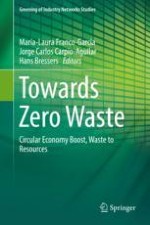2019 | OriginalPaper | Buchkapitel
5. Circularity of Wastes: Stakeholders Identity and Salience for Household Solid Waste Management in Cimahi City, West Java Province, Indonesia
verfasst von : Vina Septi Suherman, María-Laura Franco-García, Oekan S. Abdoellah, Denny Kurniadie, Yuli Astuti Hidayati
Erschienen in: Towards Zero Waste
Aktivieren Sie unsere intelligente Suche, um passende Fachinhalte oder Patente zu finden.
Wählen Sie Textabschnitte aus um mit Künstlicher Intelligenz passenden Patente zu finden. powered by
Markieren Sie Textabschnitte, um KI-gestützt weitere passende Inhalte zu finden. powered by
